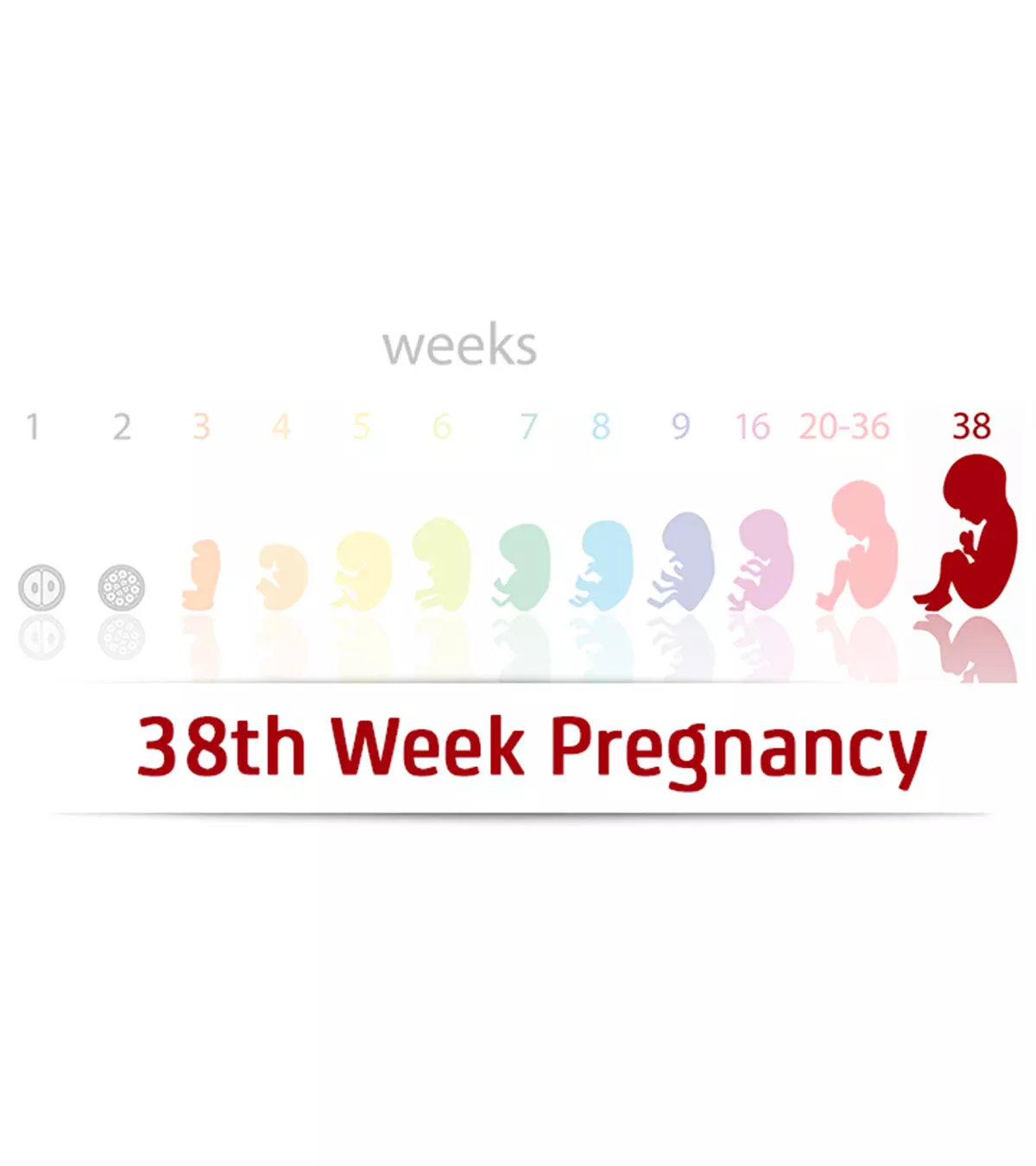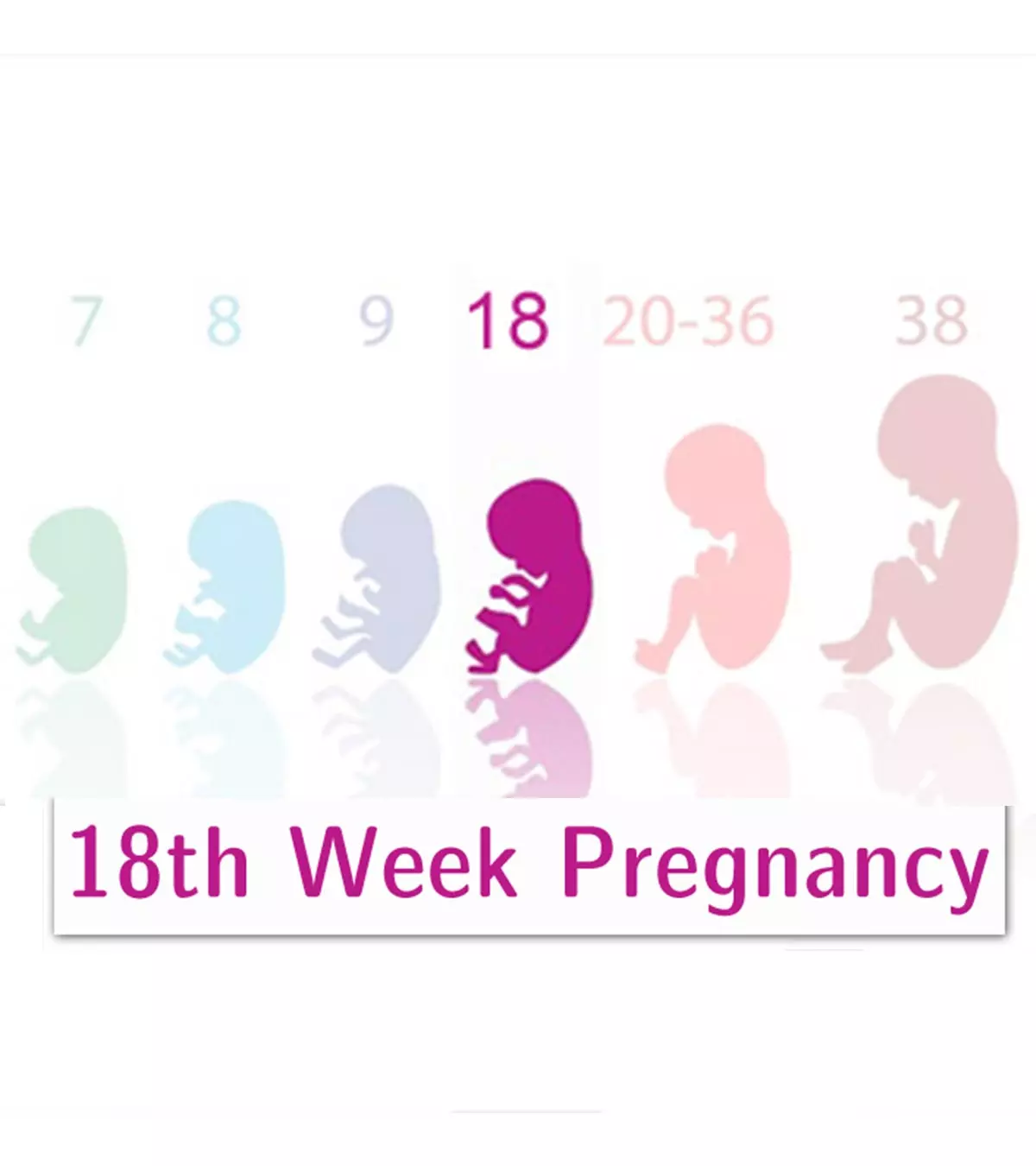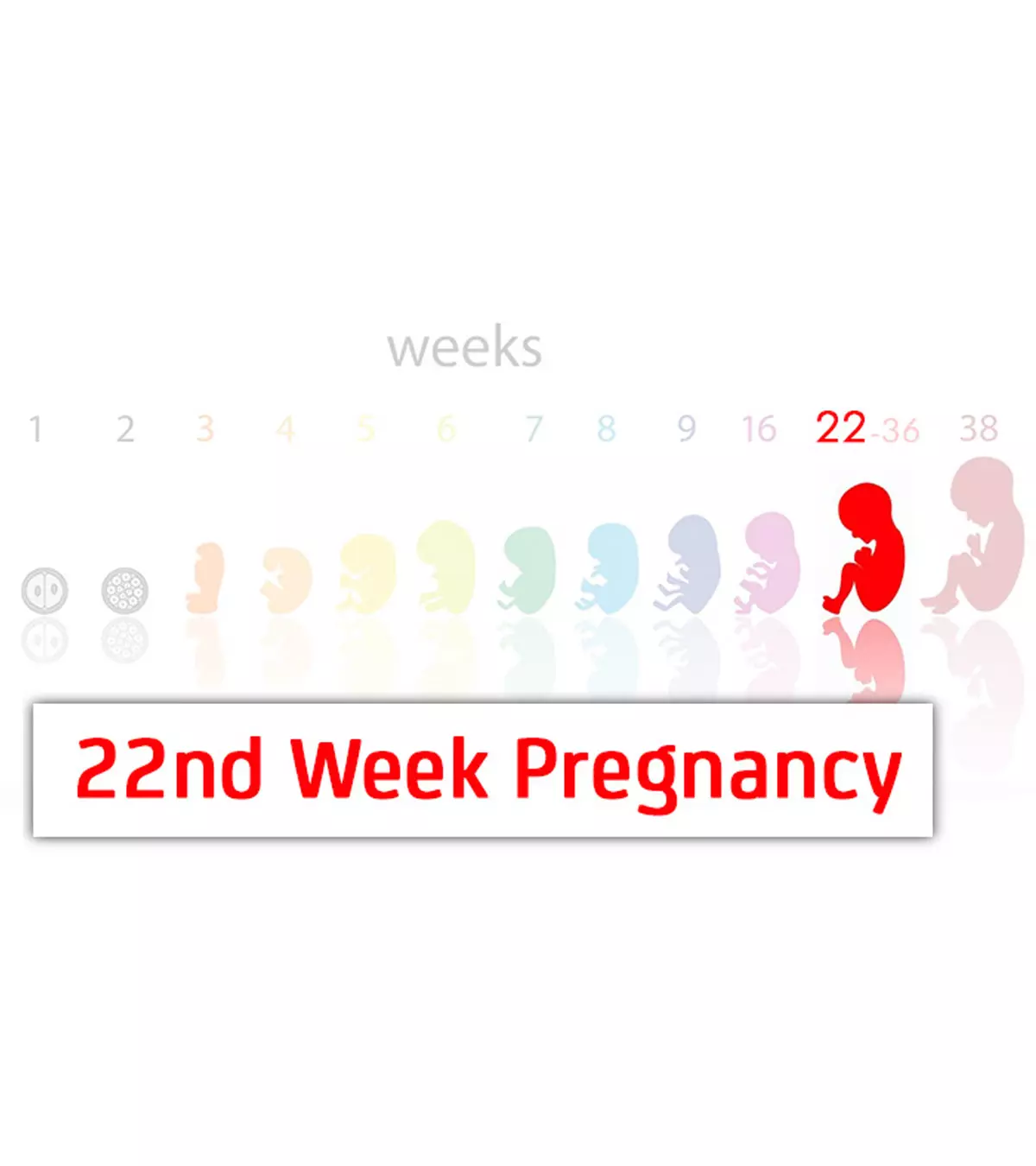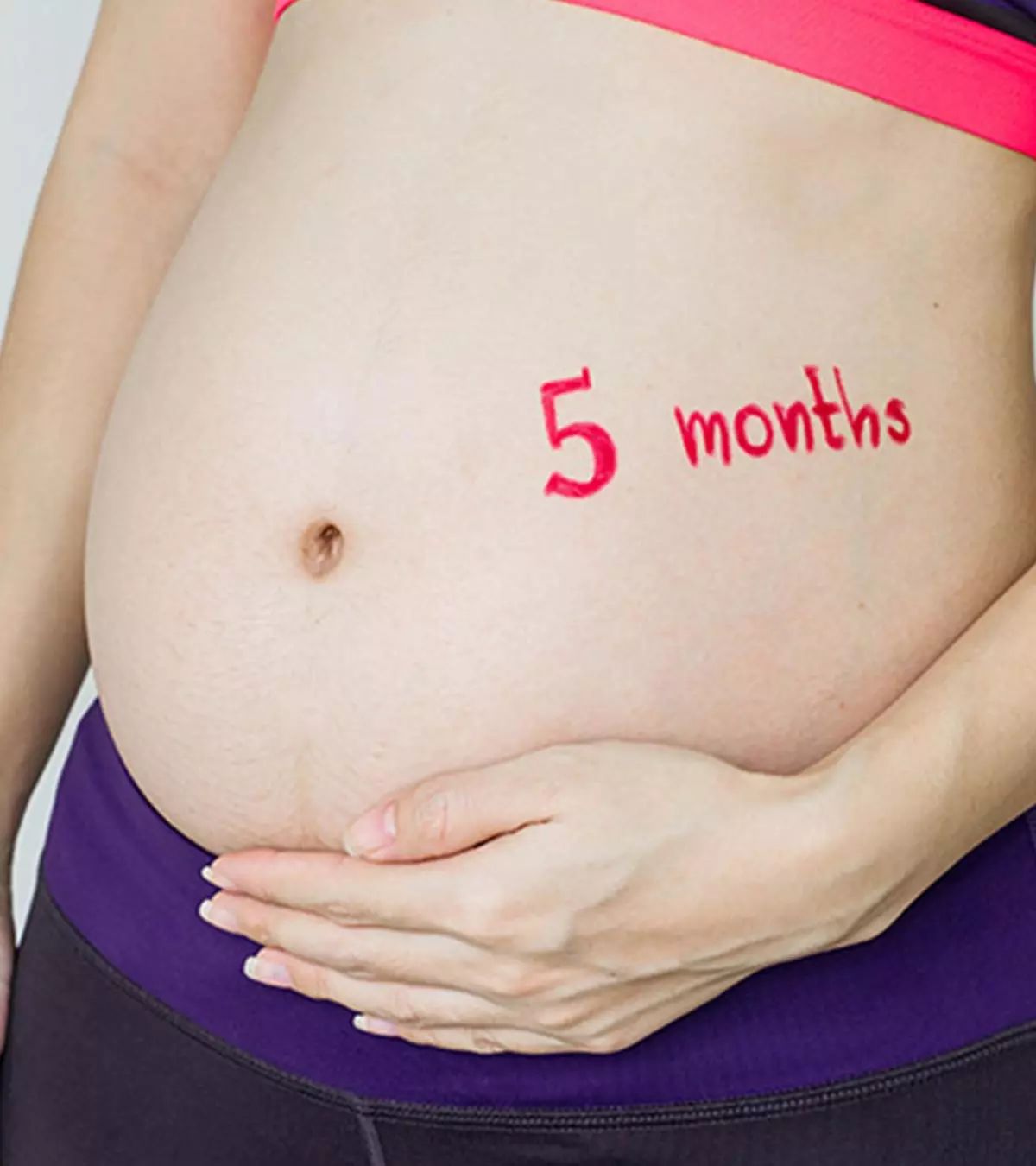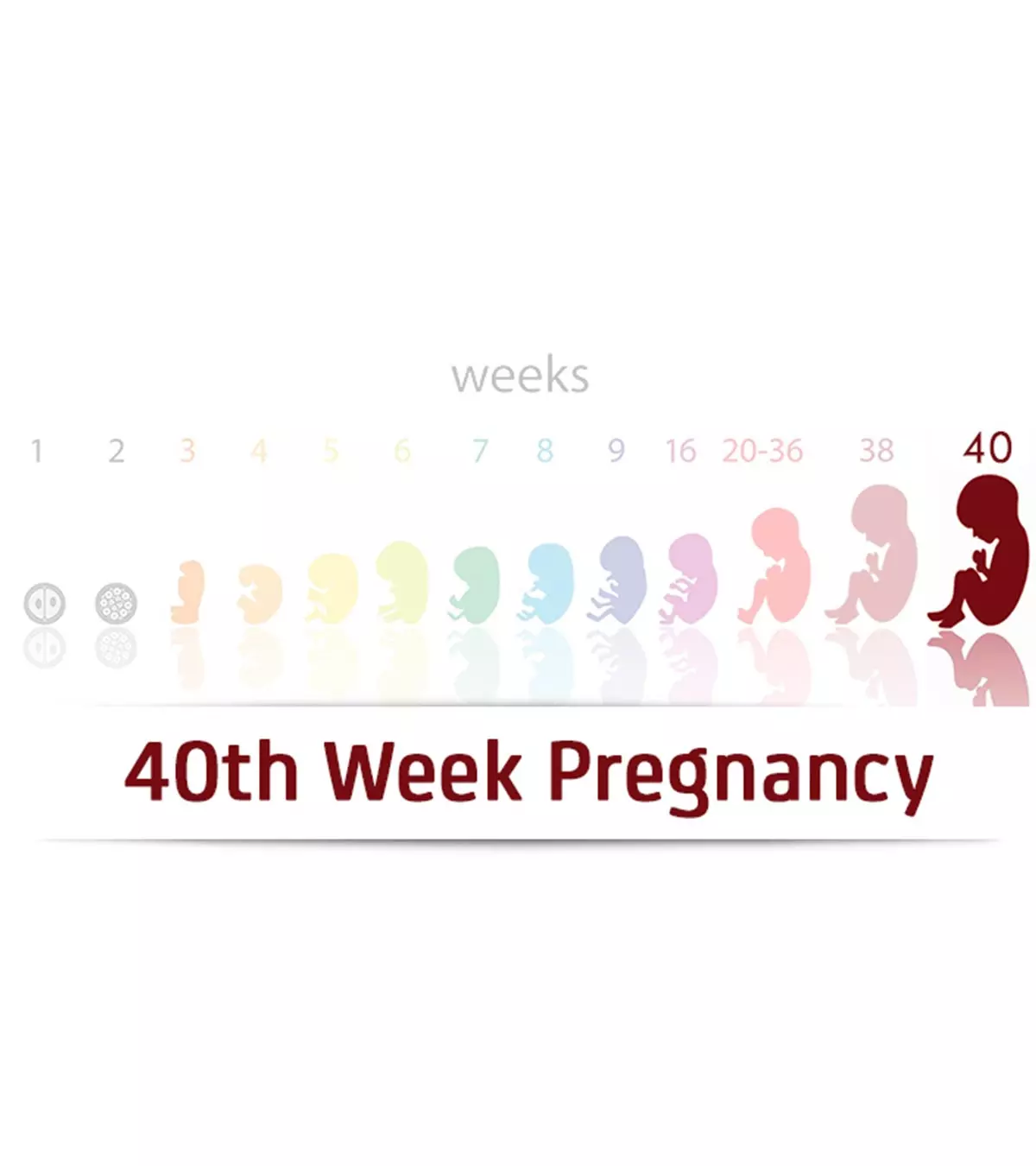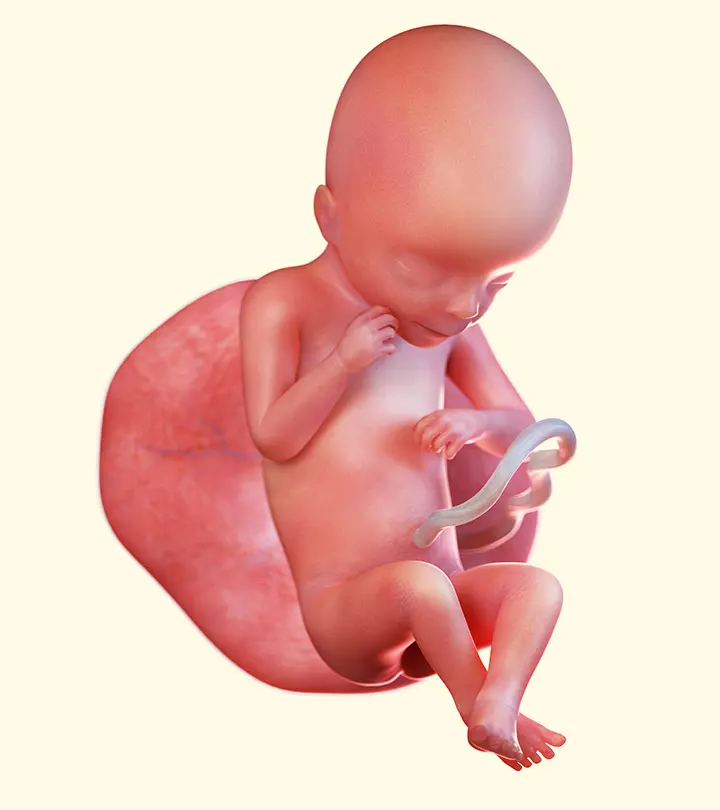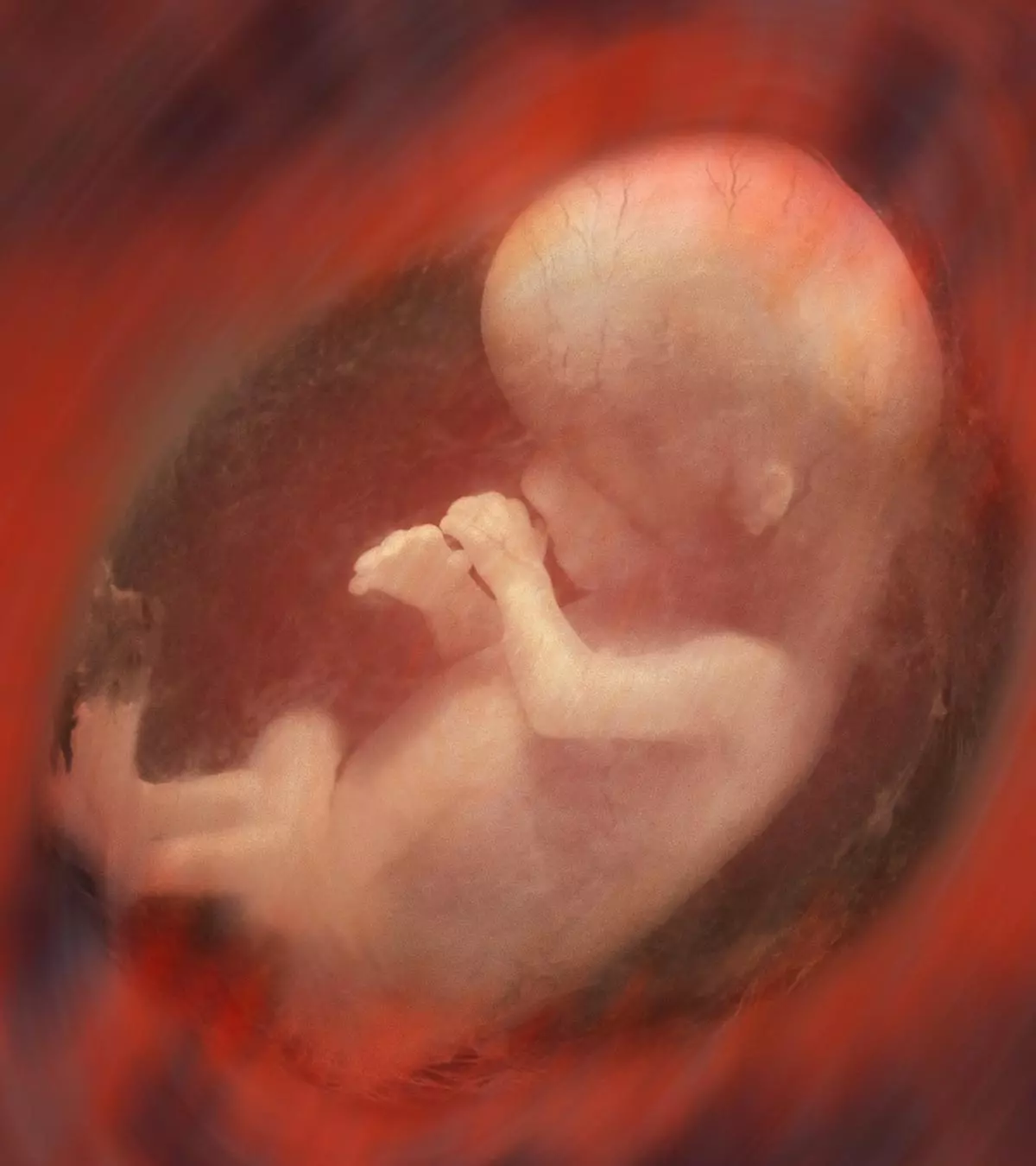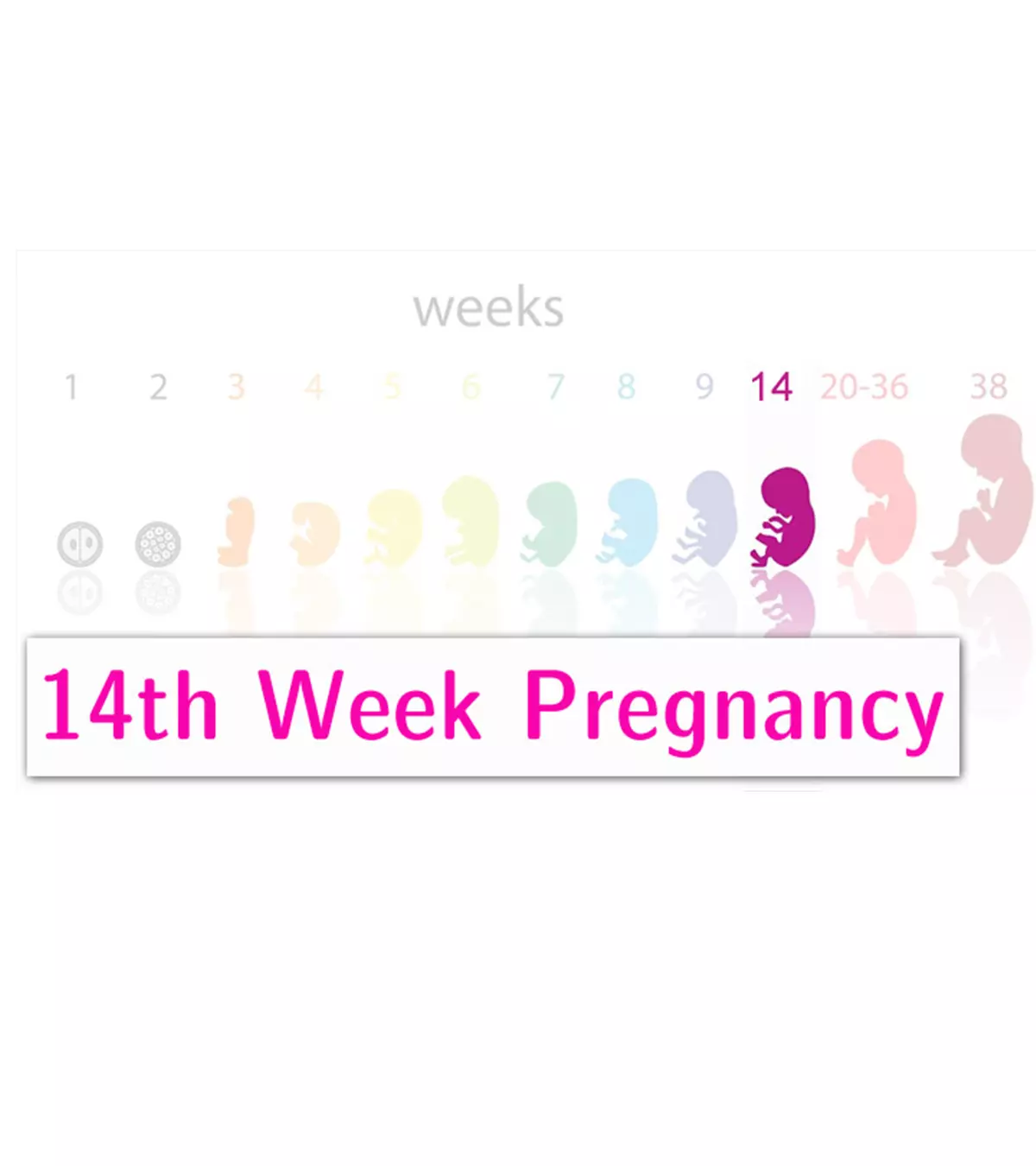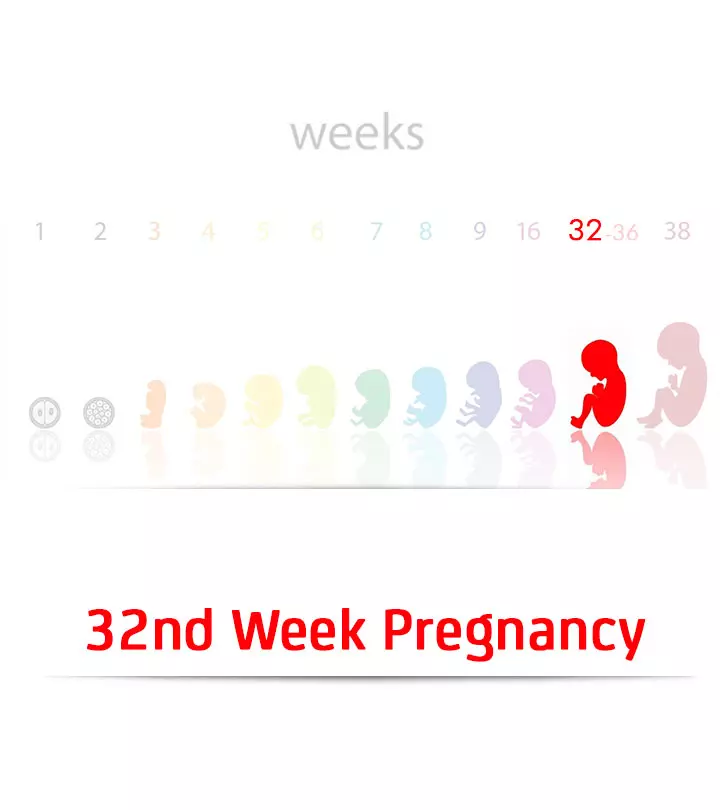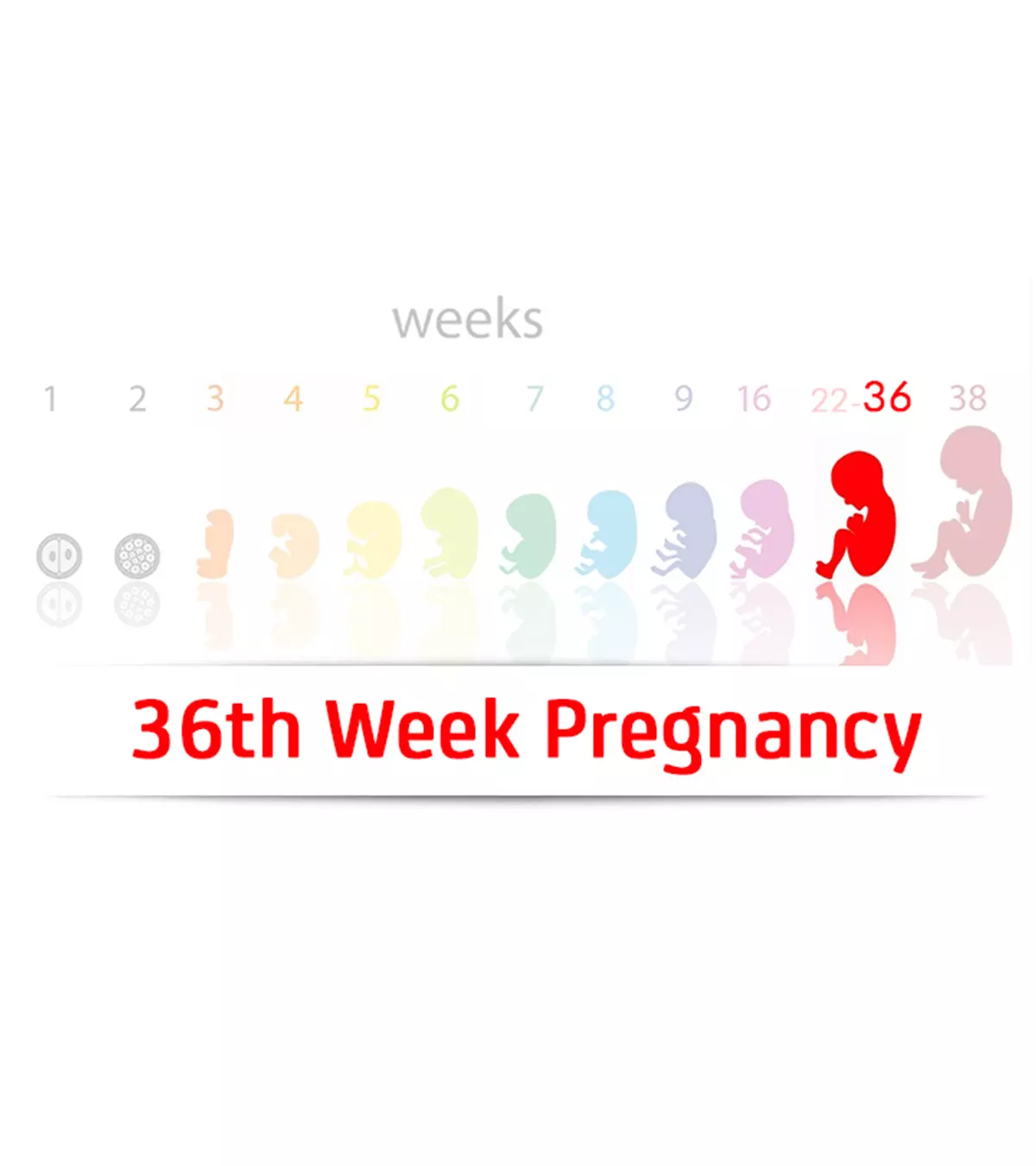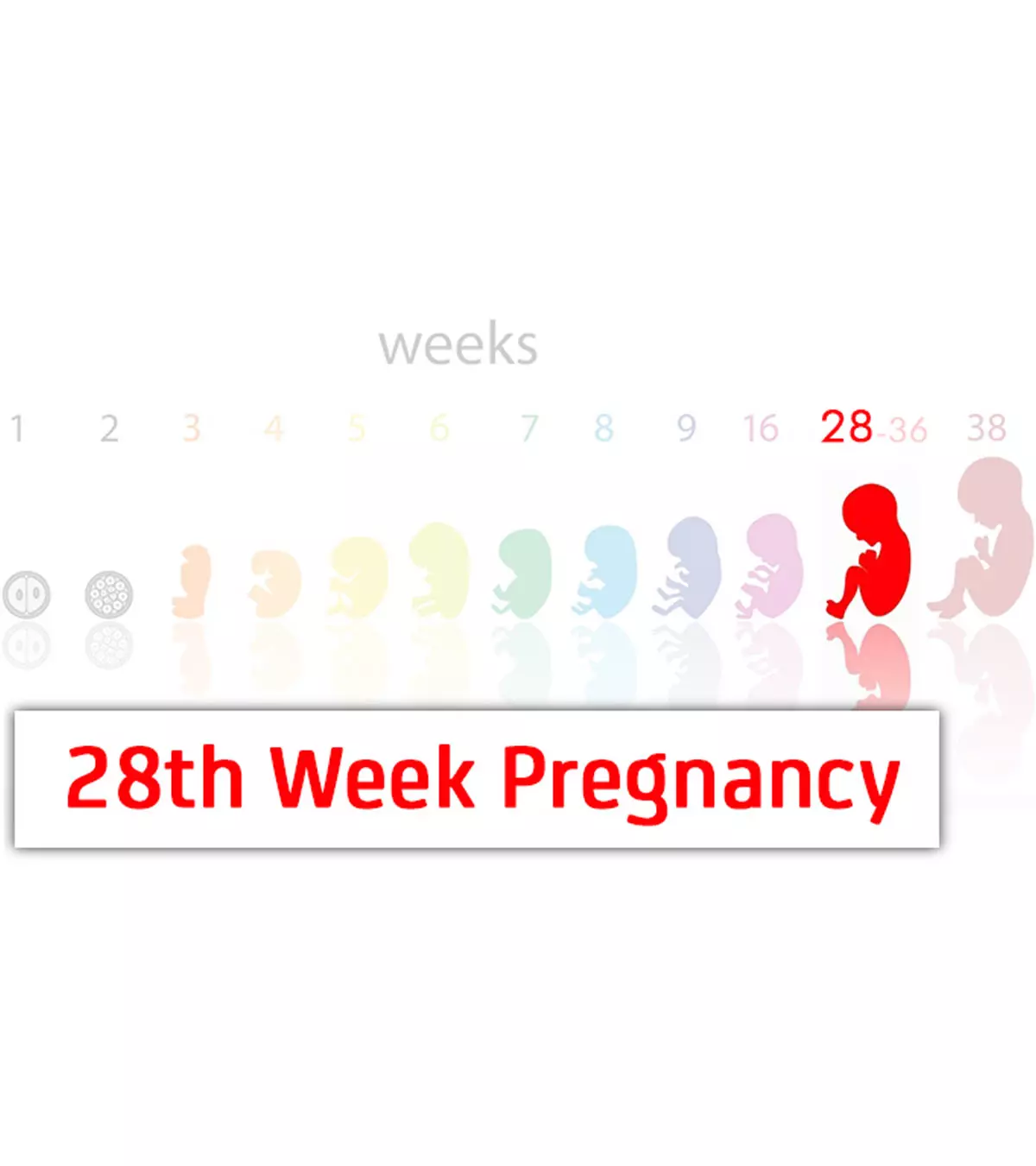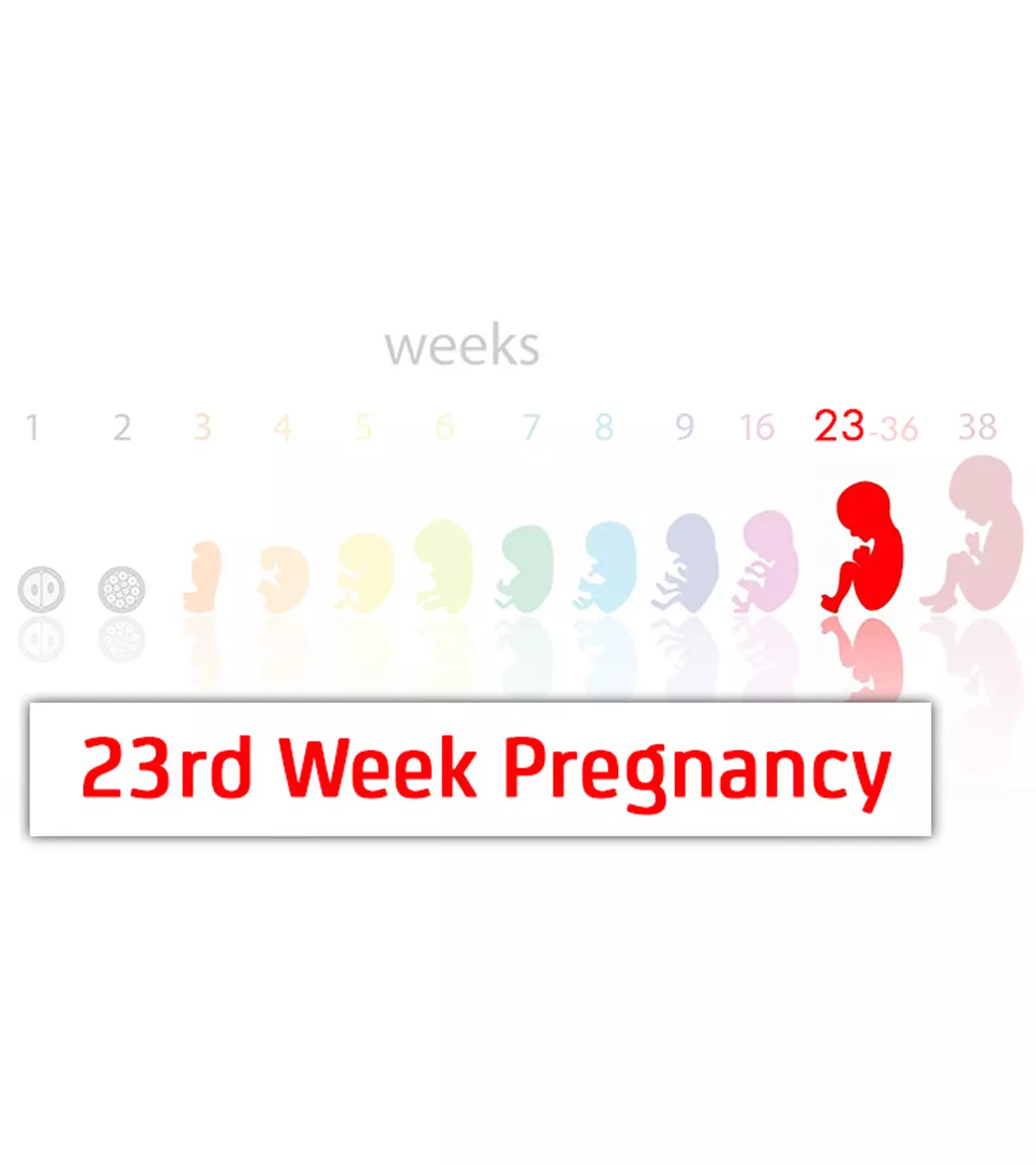
Image: ShutterStock

Key Pointers
- At 23 weeks of pregnancy, the third trimester begins and the baby is roughly the size of a large mango.
- Common symptoms during this stage may include weight gain, swelling, frequent urination, and backaches.
- Other physical and emotional changes you may experience include anxiety, an increase in areola size, and an enlarged belly.
- Your doctor will monitor your weight, blood pressure, fetal heart rate, and perform an ultrasound.
- To ensure a healthy pregnancy, it is recommended to stay hydrated, eat nutritious foods, avoid stress, and get enough sleep.
How Many Months Pregnant Are You At 23 Weeks?
At 23 weeks, you are in the sixth month of pregnancy and will be entering the third trimester in a few weeks.
How Big Is Your Baby At 23 Weeks?
This week, your baby is about the size of a large mango (1). Your baby bump may be slightly visible. The baby measures 11.38in (28.9cm) in length and weighs 1.1lb (501g) (2).
Baby Development In The 23rd week
The baby’s movements are prominent this week, and you can feel the kicks. The baby’s body parts also continue to develop this week.
| Body organs | Development |
|---|---|
| Face (3) | Fully formed. |
| Nipples | Developing. |
| Bone marrow (4) | Begins making blood cells. |
| Lungs | Developing. Alveoli are growing (5). Starts producing surfactants that help baby stay inflated after a breath (6). |
| Skin | Fat starts depositing beneath the skin, which is loose and wrinkled (7). |
| Eyes (8) | Rapid eye movements begin. |
| Reflexes | Baby starts gripping and gets startled. |
| Hair (6) | Begins to develop color. |
| Pancreas | Starts developing insulin. |
With these developments, you will notice specific pregnancy symptoms this week.
 Point to consider
Point to considerWhat Symptoms Of Pregnancy Do You Experience In The 23rd Week?
Symptoms you experience in the 23rd week are:
- Weight gain: An average weight gain of one to two pounds per week during the second trimester of pregnancy is considered safe, as recommended by the American Pregnancy Association (APA) (9). However, in case of women with BMI less than 18.5 and greater than 24.9, the recommended weight gain rates usually range between 0.5 and one pound.
| BMI | Below 18.5 | 18.5 – 24.9 | 25 – 29.9 | 30 and Above | |
|---|---|---|---|---|---|
| Weight gain (pounds) | 13kg | 11-16kgs | 7-11kgs | 5-9kgs | |
- Edema or water retention causes slight swelling in feet and ankles.
- The growing fetus demands more nourishment that increases your appetite and makes you feel hungry all the time. Pregnancy cravings are also common.
- Due to hormonal changes, the nasal membranes cause increased secretion of the mucus causing nasal congestion.
- Nasal congestion due to swollen mucus membrane leads to snoring.
- The pressure put by the growing uterus on the bladder increases the frequency of urination (10).
- The extra weight of the baby puts more pressure on the lower back causing a backache. It may be more painful in women carrying multiple babies.
- The hormonal fluctuations cause swelling, loosening, or bleeding of the gums (11).
- ProgesteroneiA female reproductive hormone that plays an important role in menstruation, pregnancy, and breastfeeding. relaxes the gastrointestinal tract and slows down the digestion process. So the food stays in the tract for a long time, making you feel bloated.
- Swelling during pregnancy puts pressure on the nerves in the wrists and hand, causing a tingling in the hands, also called carpal tunnel syndrome.
- The increased blood flow in the lower body causes the veins in the legs to swell up, resulting in varicose veins iSwollen and twisted veins caused by increased blood pressure, which can occur in any part of the body but is common in legs. (12).
- Dehydration or staying hungry can lead to occasional headaches and giddiness. These symptoms bring in emotional and physical changes in you (10).
 Things to know
Things to knowChanges In The Body At 23 Weeks
Here are some physical and emotional changes you may experience this week:
Physical changes:
- Enlarged belly with a protruding belly button

- Stretch marks
- Discoloration of skin, as some dark patches develop due to increased melanin. Linea nigraiDark line that develops vertically down the belly during pregnancy. also gets darker.
- Aerola becomes darker and bigger.
Emotional changes:
- Anxiety
- Mood swings
If you experience any other changes that are not typical of pregnancy, call the doctor.
When To Call The Doctor
Call your doctor right away in the case of (11):
- A contraction, period-like pain in every 10 minutes (five or more in an hour)
- Amniotic fluid leak from the vagina, due to rupture of the amniotic sac
- Period-like cramps
- A low and dull backache

- Pelvic pressure
- Abdominal cramps with or without diarrhea
- An unusual increase in vaginal discharge
- Blood from vagina
Some of these symptoms or others may indicate preterm labor. Next, find out how to identify the signs and symptoms of preterm labor at 23 weeks (13).
Your OB/GYN Visit
During the prenatal testing the doctor will check:
- Weight
- Blood pressure
- Fetal heart rate with a fetoscopeiA horn-shaped stethoscope-like device used to gather information about the fetus in the uterus.

- ECG cardiac check up
An ultrasound may also be done to get comprehensive details of the fetal development. However, it may not give details about all the organs. It detects any congenital defects or abnormalities in the fetus (12).
Based on the tests, the doctor will tell you about any changes needed in your diet or lifestyle. You should also continue to take care of yourself at home so that the pregnancy progresses smoothly.
Tips For Mom-To-Be
Here are the tips to follow for a healthy pregnancy:
- Drink fluids to stay hydrated.
- Eat home cooked food. Include salmon, pollock, and anchovies, which are a good source of omega-3 fatty acids. Avoid fishes such as tilefish, shark, swordfish and king mackerel that have high levels of mercury.
- Stay calm and avoid any stress.
- Take prenatal vitamins with folic acid and iron (recommended dosage 27 mg daily) (13).
- Avoid smoking, drugs, alcohol consumption and excess caffeine.
- Get enough rest.
- Indulge in mild exercises like walking to stay energetic.

- Maintain oral hygiene.
- Wear loose, breathable clothes.
- Do not take any medication without the doctor’s permission.
- Do not clean the cat litter, to avoid toxoplasmosisiInfection caused by the Toxoplasma gondii parasite, leading to increased risk of miscarriage and other health problems. .
- Avoid exposure to toxic chemicals.
- Avoid laptop operation on the lap, reduce mobile phone usage.
- Read pregnancy books for childbirth education.
Take your partner’s help to make life a little more comfortable at this time.
 Quick tip
Quick tipTips For Dad-To-Be
Here’s what your partner can do:
- Create a welcoming environment at home.
- Help you with the daily household chores.
- Go with you to all the prenatal care visits.
- Go shopping to buy some maternity clothes.
- Read some pregnancy books and use pregnancy apps.
- Plan a dinner date.
- Give you a good neck and foot massage if needed.
- Plan a baby shower and discuss nursery preparation.

Frequently Asked Questions
1. How often should I feel my baby move at 23 weeks?
There is no definite number of movements one can expect at 23 weeks. The baby’s movement pattern becomes more predictable between 24 and 28 weeks, and then you can keep track. However, if you see a sudden drop in fetal activity from what you have noticed, you should contact your healthcare provider (14).
2. Can I know my baby’s gender at 23 weeks?
You can identify your baby’s gender at any time during pregnancy from the 11th week (15).
3. Is a fetus fully developed at 23 weeks?
At 23 weeks, the baby is not yet fully developed, but is growing at a rapid pace(3).
4. How should I sleep at 23 weeks pregnant?
According to research, it is beneficial for you to sleep on your side, typically on the left side, to facilitate circulation to the fetus and reduce pressure on your own blood vessels(19).
5. Can my baby hear me at 23 weeks?
At 18 weeks, the unborn baby initiates listening to sounds inside your body, such as your heartbeat. Research shows that at around 23 weeks, a few fetuses may be able to respond to noise impulses and most healthy fetuses at week 28 are able to respond to noise impulses(20)(21).
6. How much does a fetus sleep at 23 weeks?
Researchers have highlighted that babies between 21 and 24 weeks of gestational age may sleep 12 to 14 hours each day(22).
At 23 weeks of pregnancy, many women have already begun to feel the baby’s movement. The fetus’s organs are developing at a rapid speed. Your bump may be prominently visible now. You may be experiencing some unpleasant pregnancy symptoms such as frequent urination, swollen ankles, bleeding gums, backache, snoring, etc. Keep an eye on the baby’s movements and contact your healthcare professional if you notice a sudden reduction or alteration in the baby’s fetal movement. Reach out to emergency services if you notice any bleeding, cramping, contractions, etc.
At 23 weeks of pregnancy, your baby will be as big as a large mango, and you can even feel their kicks by this week. Check out the infographic below to learn about other pregnancy-related symptoms you would experience during the 23rd week to better understand your pregnancy journey.
Some thing wrong with infographic shortcode. please verify shortcode syntaxIllustration: 23 Weeks Pregnant: Symptoms Baby Development And Tips
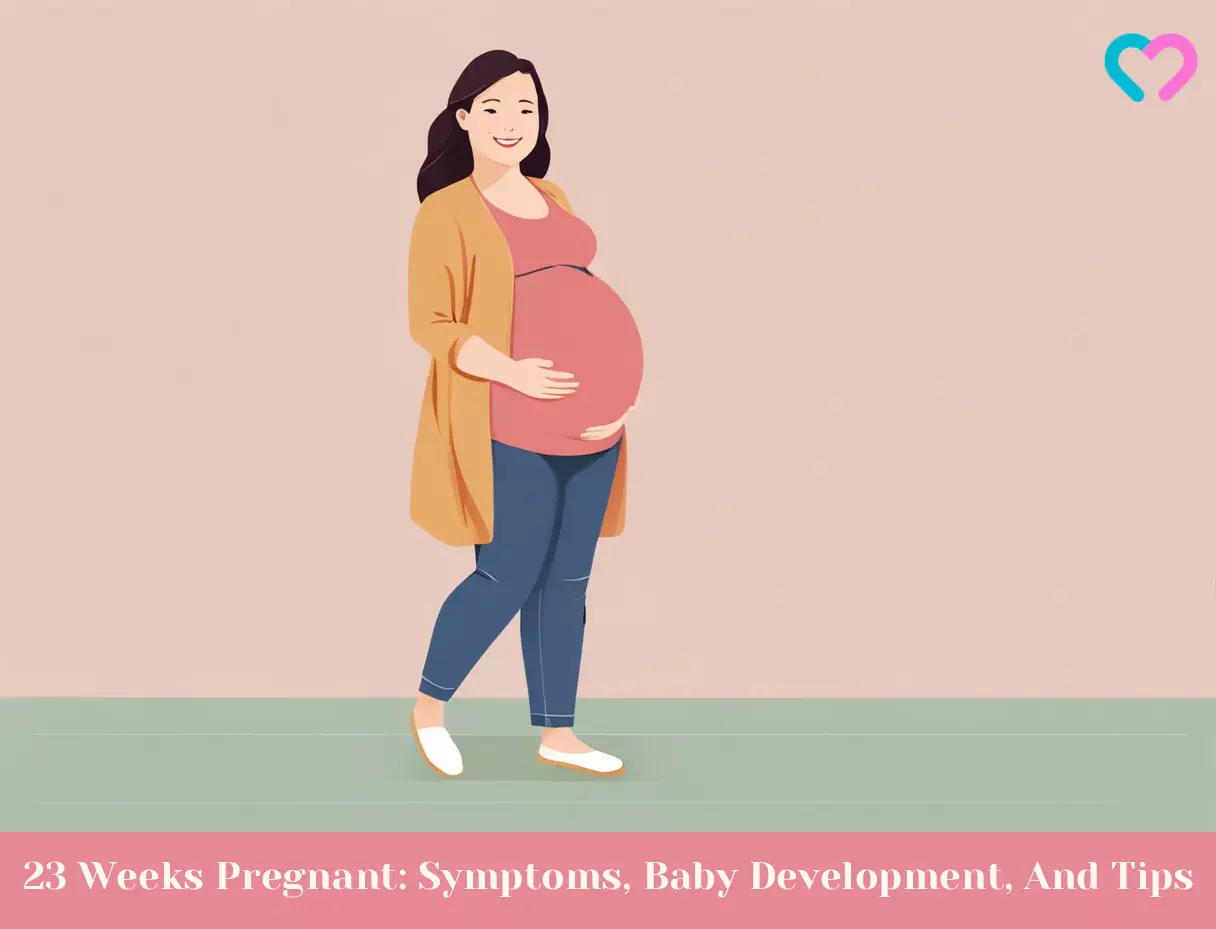
Image: Stable Diffusion/MomJunction Design Team
Week 23 of pregnancy is an exciting time! It’s at this gestational age that your baby’s bones start hardening, and they can hear your voice. Watch this video for more details.
References
- Week by Week Fetus Size Demonstrated by Fruits.
https://epaoa.org/week-by-week-fetus-size-demonstrated-by-fruits/ - Fetal Development.
https://embryology.med.unsw.edu.au/embryology/index.php/Fetal_Development - 23 Weeks Pregnant: Your Baby Can Hear Everything You Say.
https://www.healthywomen.org/content/article/23-weeks-pregnant-symptoms-and-signs - Fetal development.
https://medlineplus.gov/ency/article/002398.htm - Pregnancy Week By Week.
https://www.duedatecalculator.org/pregnancy-week-by-week/ - 23 weeks pregnant.
https://raisingchildren.net.au/pregnancy/week-by-week/second-trimester/23-weeks - Week 23.
https://kidshealth.org/en/parents/week23.html - Prenatal Summary.
https://www.ehd.org/prenatal-summary.php - Pregnancy Weight Gain.
https://babyyourbaby.org/pregnancy/during-pregnancy/weight-gain/ - Week 23 – your 2nd trimester.
https://www.nhs.uk/start-for-life/pregnancy/week-by-week-guide-to-pregnancy/2nd-trimester/week-23/ - Premature Labor.
https://www.sutterhealth.org/health/what-is-premature-labor - Monitoring of Pregnancy and Medical Examinations During Pregnancy.
https://publicmoh.health.gov.il/pages/errorNotFound.html - Nutrition During Pregnancy.
https://www.acog.org/womens-health/faqs/nutrition-during-pregnancy?utm_source=redirect&utm_medium=web&utm_campaign=otn#iron - Baby movements during pregnancy.
https://www.pregnancybirthbaby.org.au/baby-movements-during-pregnancy#:~:text=There%20is%20no%20set%20numberfor%20you%20and%20your%20baby - Farideh Gharekhanloo; The ultrasound identification of fetal gender at the gestational age of 11–12 weeks.
https://www.ncbi.nlm.nih.gov/pmc/articles/PMC5958571/ - Fetal Development: Stages of Growth.
https://my.clevelandclinic.org/health/articles/7247-fetal-development-stages-of-growth - Pregnancy at week 23.
https://www.pregnancybirthbaby.org.au/pregnancy-at-week-23 - Pregnancy Week 23.
https://americanpregnancy.org/healthy-pregnancy/week-by-week/23-weeks-pregnant/ - Best Sleeping Positions During Pregnancy
https://americanpregnancy.org/healthy-pregnancy/pregnancy-health-wellness/sleeping-positions-while-pregnant/ - When can my unborn baby hear me? I’d love to be able to read and sing to them.
https://www.healthychildren.org/English/tips-tools/ask-the-pediatrician/Pages/I%E2%80%99m-pregnant-and-would-like-to-sing-to-my-unborn-baby.aspx#:~:text=At%20around%2018%20weeks%20of,same%20level%20as%20an%20adult. - Selis Gülseven Güven, et al.; (2019); Does Noise Exposure during Pregnancy Affect Neonatal Hearing Screening Results?
https://www.ncbi.nlm.nih.gov/pmc/articles/PMC7158898/ - Your pregnancy: weeks 21 to 24
https://healthy.kaiserpermanente.org/health-wellness/maternity/second-trimester/weeks-21-24#:~:text=Although%20it%20might%20not%20feel,to%2014%20hours%20every%20day.
Community Experiences
Join the conversation and become a part of our nurturing community! Share your stories, experiences, and insights to connect with fellow parents.
Read full bio of Dr. Jayashree Jayakrishnan
Read full bio of Sakshi Mishra
Read full bio of Rebecca Malachi
Read full bio of Aneesha Amonz






